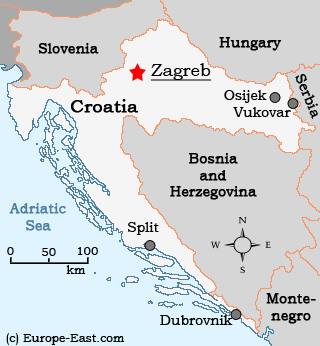Official name
Republika Hrvatska (abbr. HR, Republic of Croatia). Note that the "H" in Hrvatska is pronounced as the Scottish "ch" in "loch" (phon. symbol: χ). There are some theories regarding the origin of the name: The tribe of the Alans, once settling in the (nowadays Russian) Don area, used the following word for "friend": Huarvatha. (see also →about the name 'Croatia')
Area & Population

| ||
| Clickable Map of Croatia |
Croatia covers an area of 56,538 km². It's substantially smaller than Ireland and about as big as West Virgina. Not less than 1,185 islands belong to Croatia - but only around 70 are inhabited.
The population is almost exactly 4.5 million* (2004) (half the population of Greater London), but Croatia faces a serious population problem: The birth rate is extremely low and therefore the netto growth rate is negative.
Ethnic groups in Croatia are as followed: Croats 89.6 %, Serbs 4.5 %, and some minorities (all of them less than 0.5%) e.g. Bosniaks, Hungarians, Slovenes, Czech, Roma etc (2001)*. Due to the war, many Serbs fled the country, leading to the homogenization of Croatia's population, which is quite a novelty in Croatian history.
Religion
Most of the Croats are Catholic, and so there's a parity between ethnic group distribution and religion: 87.8% are Roman-Catholic, 4.4% (Serbian-)Orthodox, 1.3% Moslems, 1.3% others (as of 2001)*.
Time zone
As in middle Europe: GMT +01 hr, with daylight-saving time (+1 hour) in summer.
*Source: CIA World Factbook
Official language is Croatian. It's not a long time ago that the language was refered to as Serbo-Croatian, although there are substantial differences between Serbian and Croatian (see below). As in →Slovenia and the Federation of Bosnia and Herzegovina (FD, see →Bosnia), Latin script is used in Croatia. However, there is a handful of diacritical symbols, which should not be ignored.
Below the reading of diacritical marks and letters with a different pronunciation to English (note that all vowels are read as in Roman languages, i.e. 'a' is read as the 'a' 'star', 'e' as 'ei' etc):
- C (c) is always read as the 'ts' in 'Tsar'
- Ć (ć) is read as the 'tch' in 'kitchen'.
- Č (č) is read as the 'ch' in 'chain' (slightly softer than ć).
- Đ (đ) is rarely used in Croation and read as the 'du' in 'education' (but softer).
- H (h) is always read as the 'ch' in the Scottish word 'loch'.
- Š (š) is read as the 'sh'-sound in 'cash'.
- Ž (ž) is read as a voiced 'sh', ie as the 'g' in 'genre'.
There are many common things between Serbian and Croatian, since both of them belong to the southern branch of Slavic languages. However, there are also many differences. As for example in the pronunciation of certain letters and combinations: A long [e] in Serbian is written and pronounced [ije] (resp -iye) in Croatian. Eg the Serbian word [река (reka)], which means 'river', becomes [Rijeka]. A short, Serbian [e] often becomes [je] (resp. -ye) in Croatian. But it's not only the pronunciation that makes the difference. There are even substantial differences in grammar and, of course, a distinctive vocabulary. As for instance the Serbian salutation 'Zdravo', which was used throughout Yugoslavia during Tito's reign. Today, 'zdravo' is not any longer in use in Croatia.
For a table with the most important vocabulary in Bulgarian and other Slavic languages →click here. Many young people and of course staff at facilities along the coastline often speak English. Anyway, German is more useful in Croatia.
©2024 Europe-East.com

 Albania
Albania Croatia
Croatia